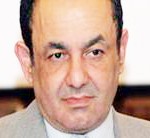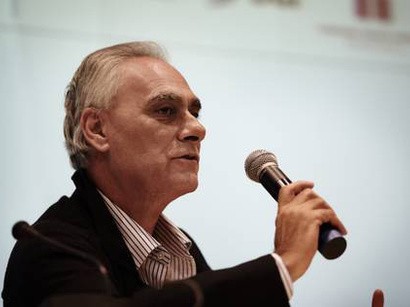Commentators discussed Morsy’s administration, the failure of Hesham Qandil’s government to solve the simplest problems and the opposition’s plans to protest on the second anniversary of the January 25th Revolution.
Opposition will not rule 25 January
Emad Al-Din Hussein
Al-Shorouk newspaper
The opposition needs to understand that the path towards democracy is a long one. Hussein believes that despite calls from opposition groups to protest in Tahrir Square on second anniversary of the January 25th Revolution, the tide of political Islam won’t be easily stemmed. The opposition, particularly the National Salvation Front (NSF), should not underestimate the ability of Islamists to mobilise people and attract voters. The road ahead should only be punctuated with peaceful demonstrations, not meaningless noise in the square.
Hussein knows his words might not be what liberals want to hear, but says he prefers to remind secular groups that the Islamist president has ruled for less than six months. He needs to be given a chance to make a difference. Even if the Islamists decided to suddenly give up politics, the writer says none of the existing secular parties are ready to take over, lacking the know-how to run a country during a democratic transition. Hussein says it would be far better for opposition parties to establish grass roots support in poor villages and rural areas to raise awareness of their vision and mission.
Morsy faces off Morsy
Ahmed Al-Sawy
Al-Shorouk newspaper
Numerous video clips on YouTube show President Morsy outlining his views on earlier train crashes, the US administration and the sought-after IMF loan, Al-Sawy writes. He criticises how Morsy, who used to be a parliamentarian and a senior leader in the Muslim Brotherhood, condemned the former government’s performance and attitude towards internal developments and incidents.
When a train crash occurred during Mubarak’s reign, Morsy, who was an MP at the time, harshly censured the ex-ruler and his government for neglecting the railway system. Now that this incident has been repeated, Morsy finds it sufficient to pay a visit to the injured. He attempts to cover up the situation while referring to the loss as a matter of destiny, Sawy says.
His earlier comments on the IMF loan vastly contradict his current willingness to continue negotiations to finalise the agreement, Sawy continues. He says the videos being shared through social media show the extreme difference between Morsy the former MP and today’s president of the republic. Morsy is probably regretting those previous statements now, not realizing at the time that he would one day be elected president and have his old remarks dug up to be compared with his current poor performance.
When will the Muslim Brotherhood beome humble?
Amr Al-Shobaki
Al-Masry Al-Youm newspaper

Al-Shobaki asks when will the Muslim Brotherhood realise that it has failed to sort out even the simplest problems in Egypt since it gained power? The once-banned group keeps on blaming the former regime for endless predicaments that it says could not be solved by any new government or president.
Although this is partly true, the writer argues that they cannot keep on pointing fingers at the old system without doing something to rescue the country from the current deteriorating situation. Shobaki believes the Brotherhood is not fulfilling its earlier promises to build a better and democratic Egypt.
Although almost all senior Brotherhood members have faced in long detentions and military trials, practically this has not qualified them to perform well while administrating Egypt in its critical transitional phase. It is the first time in history that a candidate of an outlawed group has been democratically elected leader, Shobaki claims. He says the Brotherhood’s rise to power has paved the way for other Islamist movements in Arab Spring countries to seek power.
But, although the Brotherhood has long praised the mechanics of authority; such as the judiciary and elections, it rapidly changed its tune on judges once in power, labeling them remnants of the old regime. It also refuted the idea of international monitoring of elections, preferring no observation at the ballot box, because they were already in power.
And what after the sadness?
Helmy Al-Gazzar
Al-Masry Al-Youm newspaper

After a series of sad incidents across Egypt during the last week, Al-Gazzar casts the blame on the government. Everybody is asking where is the cabinet and where are the ministers? Although Egyptians are aware that these catastrophes are the consequences of the old regime, typical citizens still inquire about the government’s plans that to solve these daily problems. In the past week only, two train crashes occurred and two buildings collapsed in Alexandria and Mansoura. The government does not seem responsive to its people, states the writer.
He adds that none of the ministers has publicly explained what are the next steps to be taken from his ministry to resolve the situation. Without a shadow of doubt, the government is politically responsible for every single challenge facing a small village in Egypt. But as for our responsibility, being the real owners of this country, the writer says Egyptians have to work with dedication to help this state to grow. Egyptians also have to keep an eye on the performance of the ministers to hold them accountable for their actions.
The industry of laws in Egypt
Motaz Billah Abdel Fattah
Al-Watan newspaper
Without a doubt Egypt requires a total overhaul of its legislative system and the way it drafts new laws. Abdel Fattah praises the Ministry of Justice for holding making debates over draft laws public. Through these sessions, the writer believes the ministry is increasing its opportunity to receive advice from legal experts on the regulations being debated.
Upcoming legislation will be critical in Egypt’s coming phase and in its democratic transition. Looking at the government’s legislative plan, the writer says there is a minimum of 45 laws that need to be looked at. Therefore, all the country’s institutions should coordinate to share their insights over the long list of laws awaiting discussion.
There will be a lot of debate between different organisations. To avoid disputes over draft laws, the writer suggests that we start planning for social dialogue that takes place within the framework of public sessions, similar to those organised by the Ministry of Justice, to achieve a balance between freedoms and rights and to allow every party to contribute to the country’s legal system.






